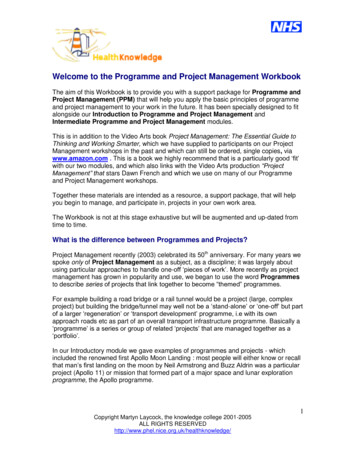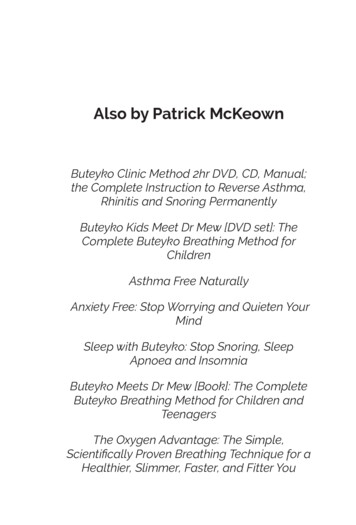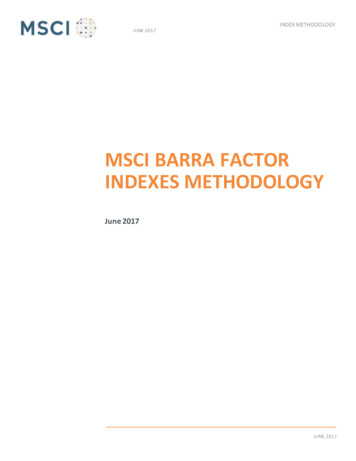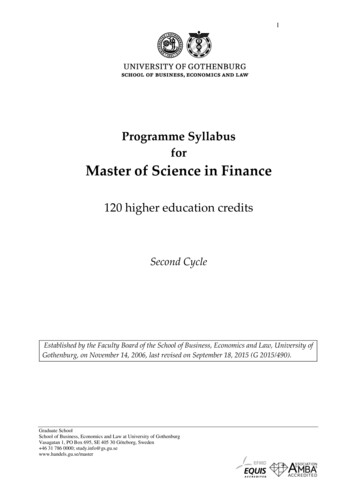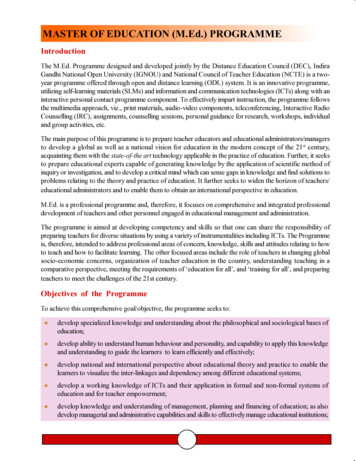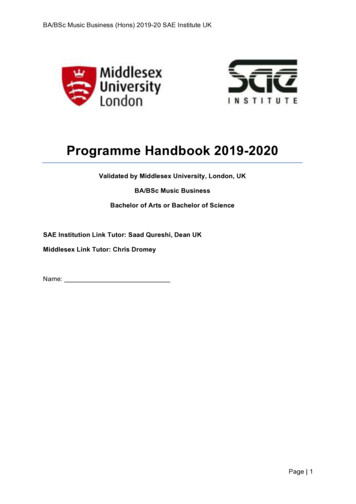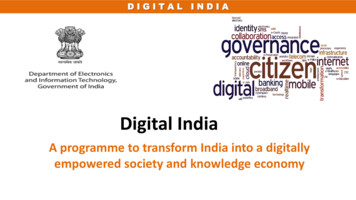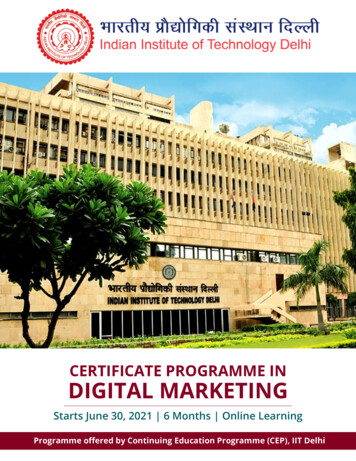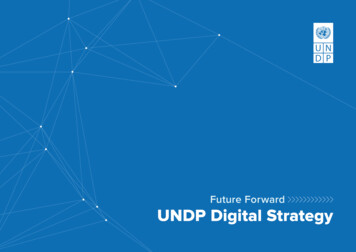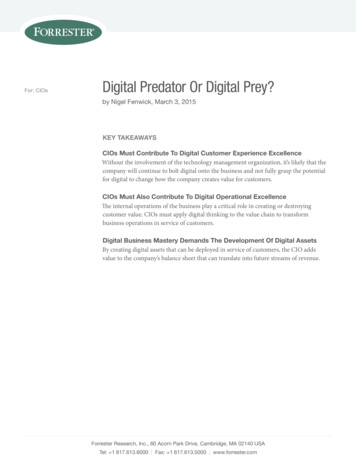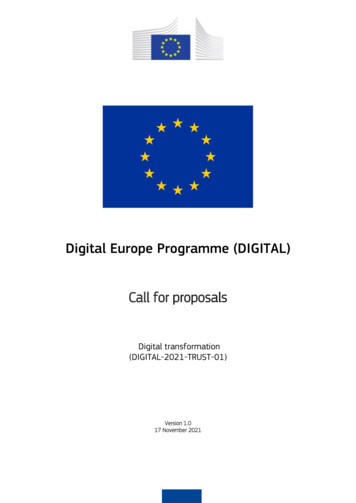
Transcription
Digital Europe Programme (DIGITAL)Call for proposalsDigital transformation(DIGITAL-2021-TRUST-01)Version 1.017 November 2021
Call: DIGITAL-2021-TRUST-01- Digital TransformationEU Grants: Call document (DEP): V1.0 – 17.11.2021HISTORY OF CHANGESVersionPublicationDate1.017.11.2021Change PageInitial version (new MFF). 2
Call: DIGITAL-2021-TRUST-01- Digital TransformationEU Grants: Call document (DEP): V1.0 – 17.11.2021EUROPEAN HEALTH AND DIGITAL EXECUTIVE AGENCY(HaDEA)HaDEA.B - Digital, Industry and SpaceHaDEA.B.2.01 – Digital EuropeCALL FOR PROPOSALSTABLE OF CONTENTS0. Introduction . 51. Background . 62. Objectives — Scope — Outcomes and deliverables — KPIs to measure outcomes anddeliverables — Targeted stakeholders — Type of action — specific topic conditions . 8DIGITAL-2021-TRUST-01-EDMO — European Digital Media Observatory (EDMO) - national andmultinational hubs . 8Objectives . 8Scope. 8Outcomes and deliverables . 9Targeted stakeholders .10Type of action .11Specific topic conditions.12DIGITAL-2021-TRUST-01-SAFERINTERNET — Safer Internet Centres (SICs) .12Objectives .12Scope.12Outcomes and deliverables .15KPIs to measure outcomes and deliverables .16Targeted stakeholders .16Type of action .16Specific topic conditions.17DIGITAL-2021-TRUST-01-ECODEX — e-Justice Communication via Online Data Exchange (eCODEX) .17Objectives .17Scope.17Outcomes and deliverables .20KPIs to measure outcomes and deliverables .20Targeted stakeholders .21Type of action .21Specific topic conditions.21DIGITAL-2021-TRUST-01-DIGIPASS — Digital Product Passport: sustainable and circularsystems.21Objectives .21Scope.22Outcomes and deliverables .23KPIs to measure outcomes and deliverables .233
Call: DIGITAL-2021-TRUST-01- Digital TransformationEU Grants: Call document (DEP): V1.0 – 17.11.2021Targeted stakeholders .23Type of action .24Specific topic conditions.243. Available budget .244. Timetable and deadlines .255. Admissibility and documents .256. Eligibility .26Eligible participants (eligible countries) .26Specific cases .26Consortium composition .27Eligible activities .28Ethics .28Security.287. Financial and operational capacity and exclusion .29Financial capacity .29Operational capacity .30Exclusion .308. Evaluation and award procedure .319. Award criteria .3210. Legal and financial set-up of the Grant Agreements .33Starting date and project duration .34Milestones and deliverables .34Form of grant, funding rate and maximum grant amount .34Budget categories and cost eligibility rules .35Reporting and payment arrangements .36Prefinancing guarantees .37Certificates .37Liability regime for recoveries .37Provisions concerning the project implementation .37Other specificities .38Non-compliance and breach of contract .3811. How to submit an application .3812. Help .3913. Important .41Annex 1 .44Annex 2 .474
Call: DIGITAL-2021-TRUST-01- Digital TransformationEU Grants: Call document (DEP): V1.0 – 17.11.20210. IntroductionThis is a call for proposals for EU action grants in the field of Enhancing trust indigital transformation under the Digital Europe Programme (DIGITAL).The regulatory framework for this EU Funding Programme is set out in: Regulation 2018/1046 (EU Financial Regulation) The basic act (Digital Europe Regulation 2021/6941).The call is launched in accordance with the [2021-2022] Work Programme2 and willbe managed by the European Health and Digital Executive Agency (HaDEA)(‘Agency’).The call covers the following topics: DIGITAL-2021-TRUST-01-EDMO — European Digital Media Observatory(EDMO) - national and multinational hubs DIGITAL-2021-TRUST-01-SAFERINTERNET(SICs) DIGITAL-2021-TRUST-01-ECODEX — e-Justice Communication via OnlineData Exchange (e-CODEX) DIGITAL-2021-TRUST-01-DIGIPASSsustainable and circular sport:Each project application under the call must address only one of these topics.Applicants wishing to apply for more than one topic, must submit a separate proposalunder each topic.We invite you to read the call documentation on the Funding & Tenders Portal Topicpage carefully, and in particular this Call Document, the Model Grant Agreement, theEU Funding & Tenders Portal Online Manual and the EU Grants AGA — AnnotatedGrant Agreement.These documents provide clarifications and answers to questions you may have whenpreparing your application: 12the Call Document outlines the: background, objectives, scope, activities that can be funded and theexpected results (sections 1 and 2) timetable and available budget (sections 3 and 4) admissibility and eligibility conditions (including mandatory documents;sections 5 and 6) criteria for financial and operational capacity and exclusion (section 7) evaluation and award procedure (section 8) award criteria (section 9)Regulation (EU) 2021/694 of the European Parliament and of the Council of 29 April 2021 establishingthe Digital Europe Programme (OJ L 166, 11.05.2021).Commission Implementing Decision C/2021/7914 of 10.11.2021 concerning the adoption of themultiannual work programme for 2021 - 2022 and the financing decision for the implementation of theDigital Europe Programme.5
Call: DIGITAL-2021-TRUST-01- Digital TransformationEU Grants: Call document (DEP): V1.0 – 17.11.2021 legal and financial set-up of the Grant Agreements (section 10) how to submit an application (section 11)the Online Manual outlines the: procedures to register and submit proposals online via the EU Funding& Tenders Portal (‘Portal’) recommendations for the preparation of the applicationthe AGA — Annotated Grant Agreement contains: detailed annotations on all the provisions in the Grant Agreement youwill have to sign in order to obtain the grant (including cost eligibility,payment schedule, accessory obligations, etc).You are also encouraged to visit the topic website to consult the list of projectsfunded previously:DIGITAL-2021-TRUST-01-EDMO — European Digital Media Observatory (EDMO) national and multinational hubs: nced/1. BackgroundThe Digital Europe Programme will reinforce EU critical digital capacities by focusingon the key areas of artificial intelligence (AI), cybersecurity, advanced computing,data infrastructure, governance and processing, the deployment of these technologiesand their best use for critical sectors like energy, climate change and environment,manufacturing, agriculture and health.The Digital Europe Programme is strategic in supporting the digital transformation ofthe EU industrial ecosystems. It targets upskilling to provide a workforce for theseadvanced digital technologies. It also supports private sector, small and mediumsized enterprises (SMEs), and public administration in their digital transformation witha reinforced network of European Digital Innovation Hubs (EDIH). The Digital EuropeProgramme will accelerate the economic recovery and drive the digital transformationof Europe.During 2021-2022, one of the priorities of the Digital Europe Programme is'accelerating best use of technologies'. Under 'accelerating best use of technologies',the roll-out and best use of digital capacities will focus on priority areas such as thesupport to the Green Deal, to SMEs and public authorities in their digitaltransformation and will also provide resources to those activities started in previousprogrammes, for which the continuations of funding is essential not to disrupt theservices provided.This call will cover the European Digital Media Observatory (EDMO) national andmultinational hubs, Safer Internet, e-Justice Communication via online data exchange(e-CODEX) and Digital Product Passport as call topics that fall under the 'AcceleratingBest Use of Technologies priority.1. EDMO–national and multinational hubs – The Internet has profoundlychanged how citizens access information. On the one hand, it has the potentialto boost participation and inclusiveness in democratic processes. On the other6
Call: DIGITAL-2021-TRUST-01- Digital TransformationEU Grants: Call document (DEP): V1.0 – 17.11.2021hand, it can facilitate the dissemination of disinformation. The April 2018Commission Communication “Tackling online disinformation – A Europeanapproach’3has developed a strategy to limit the impact of onlinedisinformation while respecting freedom of expression and other fundamentalrights and democratic values.As part of this strategy, the European Digital Media Observatory (EDMO) waslaunched on 1 June 2020. In the current phase, EDMO has deployed the CoreService Platform made of a technical infrastructure designed to facilitateknowledge exchanges and collaborative processes among fact-checkers,academic researchers and other relevant stakeholders, whose activities will besteered and coordinated by an independent governance body. Moreover, on 26May the Commission announced the eight national and multinational hubs ofEDMO selected through a competitive call for proposals. The selected hubscover Ireland, Belgium, Czech Republic, Denmark, Finland, France, Italy,Luxemburg, the Netherlands, Poland, Slovakia, Spain, Sweden, as well asNorway, in the EEA. All the hubs are now operational. This call is to createadditional hubs and cover the EU Member States and EEA countries whichwere not yet covered by the selected hubs.2. Safer Internet Centres (SICs) has the objective to support national SaferInternet Centres in providing online safety information, educational resources,public awareness tools and counselling and reporting services, throughdedicated helplines and hotlines for children, parents, and teachers and otherprofessionals working with children. This call contributes to building trust inthe digital transformation by supporting the sustainability of the BetterInternet for Kids (BIK) strategy4 which is expected to be updated in 2022.3. e-Justice Communication via Online Data Exchange (e-CODEX) is a alisation,thecommunication in the context of cross-border judicial proceedings. e-CODEXconsists of a package of software components that enables the interoperableconnectivity between national systems. In this way, it allows its users (judicialand other competent authorities, legal practitioners and citizens) toelectronically send and receive documents, legal forms, evidence or otherinformation in a swift and secure manner. e-CODEX has been developed andmaintained with EU financing by a consortium of Member States. TheCommission adopted on 2 December 2020 a “Proposal for a Regulation on acomputerised system for communication in cross-border civil and criminalproceedings (e-CODEX system)”, the e-CODEX Regulation5. The Proposal aimsto entrust the further development and maintenance of e-CODEX to theEuropean Union Agency for the Operational Management of Large-Scale ITSystems in the Area of Freedom, Security and Justice (eu-LISA) as of 2023.4. Digital Product Passport - sustainable and circular systems: has theobjective to support sustainable production, to enable the transition to circulareconomy, to provide new business opportunities to economic actors, tosupport consumers in making sustainable choices and to allow authorities toverify compliance with legal obligations.345Communication from the Commission “Tackling online disinformation: a European Approach”COM(2018) 236 finalEuropean Strategy for a Better Internet for Kids COM (2012) 196 finalRegulation on a computerised system for communication in cross-border civil and criminal proceedings(e-CODEX system), and amending Regulation (EU) 2018/1726 COM/2020/712 final7
Call: DIGITAL-2021-TRUST-01- Digital TransformationEU Grants: Call document (DEP): V1.0 – 17.11.2021The Participation is open to all eligible entities as established by Article. 18 of theDigital Europe programme, in particular public sector as well as private sectororganisations, including SMEs, NGOs and international organisations.2. Objectives — Scope — Outcomes and deliverables — KPIs to measureoutcomes and deliverables — Targeted stakeholders — Type of action —specific topic conditionsDIGITAL-2021-TRUST-01-EDMO — European Digital Media Observatory (EDMO) national and multinational hubsObjectivesAs indicated in the Guidance to strengthen the Code of Practice on Disinformation 6,EDMO and its national hubs are crucial to address the problem of disinformationeffectively. EDMO does not only provide support in the area of research and factchecking, but it also plays an important role regarding the monitoring framework,including assisting the Commission in the assessment of the Code’s implementationand being part of the Permanent task-force.This call aims to create new independent national or multinational hubs in order toexpand the regional coverage of EDMO and its hubs. The ultimate objective of the callis to support the establishment of EDMO hubs in the Member States not yetcovered by the existing hubs7. In this regard, one Member State should becovered by only one hub (including existing hubs and hubs yet to be established). Atthe same time, one hub can cover more than one Member State8.A national/multinational hub is a network of organisations active in one or severalMember State(s), that will provide specific knowledge of local informationenvironments so as to strengthen the detection and analysis of disinformationcampaigns, improve public awareness, and design effective responses relevant fornational and regional audiences. The activities of the hubs should be independentfrom any public authority9.These national/multinational hubs will focus their activities on emerging digital mediavulnerabilities and disinformation campaigns, which are of special relevance within theterritory and/or linguistic area in which they will operate. Multinational hubs will covermore than one Member State preferably with similar media ecosystems within an EUregion. The hubs should as well strengthen the networks of independent fact-checkersat national and regional level.Scope 6789Increase the number of independent national or multinational EDMO hubs andcover Member States not yet covered by existing EDMO hubs while avoidinggeographical overlaps between hubs – one Member State should be covered onlyby one hub.European Commission Guidance on Strengthening the Code of Practice on Disinformation, 26 May 2021(COM(2021) 262 final).Member States covered by the existing EDMO hubs: Ireland, Belgium, Czech Republic, Denmark,Finland, France, Italy, Luxemburg, the Netherlands, Poland, Slovakia, Spain, Sweden, as well asNorway in the EEA.It is highly recommended that potential applicants use the ‘partner search’ functionality in the fundingand tenders portal, to check whether there are potential applicants from the same Member State andto explore the possibility for close collaboration at the application stage.In the context of this call universities and public media organisations are not considered as publicauthorities unless they are under the direct influence of the national governments.8
Call: DIGITAL-2021-TRUST-01- Digital TransformationEU Grants: Call document (DEP): V1.0 – 17.11.2021 Pull together and foster the growth of a national/multinational multidisciplinarycommunity composed of academic researchers, independent fact-checkers basedin the covered regions, media practitioners and other relevant stakeholders inorder to create a network capable of quickly detecting and analysingdisinformation campaigns, as well as producing content to support mainstreamand local media and public authorities in exposing harmful disinformationcampaigns. To this end applicants must prove their ability to reach out to at least3 experts and/or organisations not involved in the proposal with expertise inrelevant areas of investigation and research (e.g. health, climate change,immigration, security, economics, European policies, or other relevant areasprone to disinformation)10. Cooperate with EDMO and contribute to its repositories of fact-checks, medialiteracy materials and scientific articles, including surveys on disinformationtrends, situational analyses and assessments of online platforms’ policies toaddress disinformation-related harms. Hubs should aim to support the growth oflocal fact-checking and media literacy activities. Detect, analyse and disclose harmful disinformation campaigns at regional,national, multinational and EU level and analyse their impact on society anddemocracy. Hubs will analyse relevant actors, vectors, tools, methods,dissemination dynamics and prioritised targets of disinformation campaigns byapplying a common methodology, established in coordination with EDMO, tomonitor the evolution of disinformation-related harms on relevant audiences.Each hub should indicate in its proposal the type of collaborations intended withindependent media outlets operating within its territory or linguistic area. Regularly assess the impact of relevant disinformation campaigns on society anddemocratic processes, as well as the effectiveness of the policies set out by onlineplatforms to counter disinformation. In addition, the hubs will actively participatein the EDMO joint research activities selected by the EDMO Governance Body andpromptly react to EDMO requests linked to emerging disinformation issues. Support tailor-made media literacy campaigns for the covered territory orlinguistic area. Hubs will leverage on the exchange of good practices andmaterials stored on the EDMO platform and contribute to the EDMO repositorieswith their own material. Cooperate with institutions responsible for the monitoring of online platforms’policies and digital media ecosystem at national level. In particular, they willsupport the competent entities which oversee and participate in the monitoring ofthe implementation of the Code of Practice on Disinformation by its signatories.Outcomes and deliverablesThe following outcomes are expected to be elaborated in the proposal with an aim toinclude them in the Grant Agreement preparation and implementation of actions: Create the national/multinational hub, including a website and a communicationcampaign at national/multinational level; Integrate the hub into the EDMO in cooperation with EDMO’s Governance Body;and link its platform to the EDMO platform; Ensure the production of a continuous flow of fact-checks which will be stored atthe EDMO’s repository;10Relevant information should be provided in the Application Form B Section 2.39
Call: DIGITAL-2021-TRUST-01- Digital TransformationEU Grants: Call document (DEP): V1.0 – 17.11.2021 Deliver at least 10 analytical reports on specific disinformation campaigns and/orstudies linked to relevant disinformation phenomena; Deliver at least 5 media literacy campaigns or events at national/multi-nationallevel to increase citizens’ awareness and societal resilience; Deliver the annual reports on the support provided to monitor the policies put inplace by online platforms to limit the impact of disinformation; Deliver the annual reports on the activities, including the information on: i) thecooperation with other national/multinational hubs through EDMO; ii) additionalfunds received by the hubs; and iii) the process put in place to preserve theindependence of the hub.Targeted stakeholdersTargeted stakeholders are fact-checking organisations, public and private researchorganisations, media organisations, and other stakeholders which conduct relevantactivities for tackling the phenomenon of disinformation.The following conditions are considered as importantimplementation of the hub activities described above:forthesuccessfula. The entity coordinating the consortium (“coordinator”) should preferably bean independent public or private research organisation (see definition below 11If the coordinator is not an independent public or private research organisationthe proposal must: 12: Demonstrate independence of the coordinator from public authorities; Provide information about the coordinating organisation funding sourcesand demonstrate its independence from external sources of funding; Proof of coordinator’s experience and activities related to researchand/or investigations on the disinformation phenomenon.b. Public or private research organisations included in the application mustdemonstrate their relevant academic independent research experience in thefields such as communication, social and political sciences, law, economics,network science, data and computer sciences or other relevant areas 13.c. Organisations that are not public or private research organisations mustelaborate on their experience and activities related to research and/orinvestigations on the disinformation phenomenon14.d. At least one of the consortium applicants must be an independent factchecking organisation or a fact-checking unit from an independent media11121314The coordinator should be a research organisation as per its statute and should provide in theApplication Form B Section 2.3 a list with at least 10 scientific publications accepted in top conferencesand/or journals covering fields such as media and disinformation, communication science, politicalscience, network science, data and computer science or other relevant areas.Relevant information should be provided in the Application Form B Section 2.3The applicant must provide in the Application Form B Section 2.3 i)information that it is a researchorganisation as per its statute; ii) a list with at least 10 scientific publications accepted in topconferences and/or journals covering fields such as media and disinformation, communication science,political science, network science, data and computer science or other relevant areas.The applicant should provide relevant information regarding the activities in the Application Form BSection 2.310
Call: DIGITAL-2021-TRUST-01- Digital TransformationEU Grants: Call document (DEP): V1.0 – 17.11.2021organisation with proven fact-checking activities in the last 12 months 15. Theconsortium must have fact-checking services covering all geographical areacovered by the hub (i.e. in every Member State covered by the hub).Definitions of required types of applicantsFor the purposes of this call, a research organisation is intended as “an entity, such asuniversity or research institute, irrespective of its legal status (organised under publicor private law) or way of financing, whose primary goal is to conduct fundamentalresearch, industrial research or experimental development and to disseminate theirresults by way of teaching, publication or technology transfer; all profits arereinvested in these activities, the dissemination of their results or teaching;undertakings that can exert influence upon such an entity, in the quality of, forexample, shareholders or members, shall enjoy no preferential a
Call: DIGITAL-2021-TRUST-01- Digital Transformation EU Grants: Call document (DEP): V1.0 – 17.11.2021 5 0. Introduction This is a call for proposals for EU action grants in the field of Enhancing trust in digital transformation under the Digital Europe Programme (DIGITAL). The regulato

